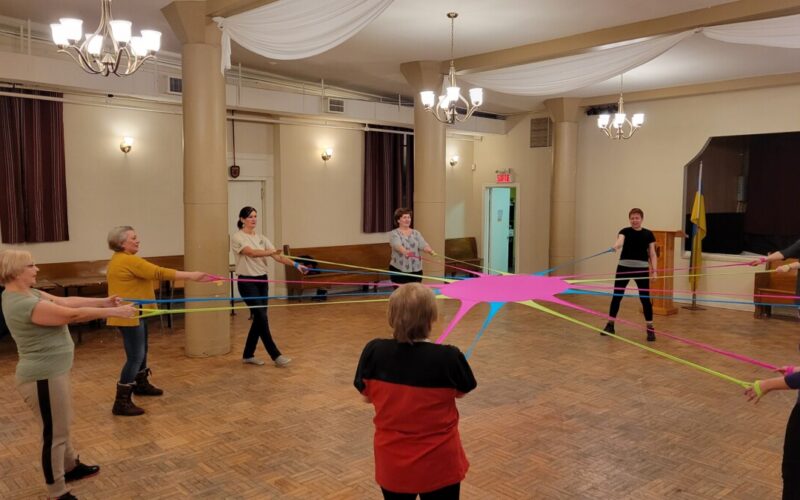As Ukraine enters the second year of war, Tetiana Lazuk uses dance-movement therapy to help refugees
One year after the beginning of the war, Ukrainian refugees in Montreal are working to heal from their difficult experiences and get settled in their new life. In the heart of the Mile End, the Ukrainian National Federation of Canada (UNF) offers wellness activities to help refugees find community through dance-movement therapy.
Tetiana Lazuk is a Ukrainian dance therapist and a scholar-in-residence at Concordia, and she leads dance-movement sessions at the UNF. During these classes (which are taught in Ukrainian), she helps refugees heal from their difficult experiences in the war through dance.
“It’s not only this psychological support, wellness,” she said, “but it’s also helping to connect people who have a lot in common, and helping them to find their place and to establish here in Canada.”
While the war has faded from public attention in the past few months, it is still very real for Ukrainians in Montreal and throughout the world.
“On Feb. 24, 2022, many people thought that Ukraine would cave within a few days, if not a few weeks,” said Michael Shwec, president of the Quebec Provincial Council of Ukrainian Canadian Congress. “We’re coming up to a year, right now, where the Ukrainian people are very resolute in their defense of their territory, their culture, their language.”
The Ukrainian Canadian Congress represents 1.4 million Ukrainians around Canada, according to their website. While they have supported the Ukrainian community from their beginnings, work has increased considerably in the last year.
“We need to help [displaced Ukrainians] land and be successful in Canada, for those who wish to stay,” said Shwec. “That means everything from housing to education, to employment, to have some sense of normalcy in their lives, and help them bridge that gap from Ukraine to here, as best as possible.”
This is exactly what Lazuck strives to do. She lived in Ukraine until 2009, when she moved to Canada to continue her studies in dance-movement therapy. She started working with Ukrainian refugees at the UNF in September.
Lazuk pointed out that her experience moving to Canada was very different from many refugees. She was prepared for her new life, for the changes it would bring, and for the challenges she would need to overcome. The refugees she works with did not get that preparation.
“These people were forced to leave their country, and many of them had excellent, great professions, perfect life conditions, and now they are forced to move to another country,” said Lazuk. “Many of them don’t speak English or French, so they need to learn, they need to adapt.”
The UNF’s aim is to provide refugees with the resources to do just that. The organization helps Ukrainians find a community and adjust to their new life in Canada.
According to Lazuk, specialized psychotherapy is important to help them process their experiences in the war. On the flip side, her dance-movement sessions help Ukrainians connect with their community and handle the hardships of leaving their homeland.
“They meet all together, they discuss what problems they’re facing, and how to get through this,” she said.
“The dance-movement therapy sessions provide something through the body that allows them to not only be in their head, but moving, connecting, and sometimes forgetting what they have in their head.”
Since last year, the Canadian government has implemented many measures to help Ukrainians coming into the country. In March 2022, the government created a new emergency travel visa for Ukrainians.
However, the war is not over, said Shwec. “As long as genocide continues in Ukraine, which it does, there’s never enough done. Enough will be when Russian forces are out of Ukraine and the genocide stops,” he said.
“Before our lives, livestreamed, is a genocide happening in what has been a very peaceful European country. The onus is on every single student to reflect on what is actually happening, and to make sure that you take a stand, and you defend the values that you believe in.”
The last time Lazuk visited her home land was in November 2021, to see her and her husband’s families — a few months before the beginning of the war. She looks forward to the next time she can visit her country, hopefully soon.
“We all hope that finally, peace comes to Ukraine, and we will be able to visit our family and help in rebuilding our country,” she said.
“Here in Canada, life continues. We have plans, we continue working. Dancing.”




